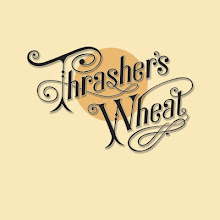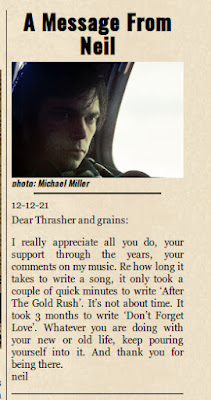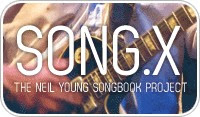"Ohio": Editorial by Bob Lefsetz
Over the years, we've paid attention to Bob Lefsetz, fwiw.
As folks may know, Lefsetz is quite an opinionated music business guy making all sorts of accurate and not so inaccurate prognostications.
For example, here's Lefsetz on Neil Young's 2014 interview on Howard Stern Show at "He was definitely not like anybody else". And there was Bob Lefsetz on Neil Young's music being available now on Spotify.
Last week, we here at Thrasher's Wheat looked forward, as we looked back to that fateful day 47 years ago at Kent State. And -- as we predicted -- once again, the mainstream media ignored the anniversary of real news, while busy either fabricating the latest fake news or generating faux celebrity drama.
So here's a take on "Ohio" by the ever irascible Bob Lefsetz:
There was a common enemy.Thanks Bob. It had to be said. And, fwiw, we have not been waiting, because
And Neil Young was Canadian. Talk to today's Canadians, the electors of a snowboarding instructor, they're completely flummoxed with what's going on south of the border. And in the seventies they sewed Canadian flags to their backpacks before they ventured overseas, so they wouldn't be confused with their American brethren, responsible for Vietnam.
Yes, Vietnam united us. Our hatred for our country's policies. Our fear that we'd die there. Truly palpable. A lot different from being executed in a video game. Rich men could get their kids in the Coast Guard, the Reserves, but there were not that many rich people and not that many who were connected so you turned eighteen, registered for the draft, and started to worry.
But the bifurcation of society began before. One can try to pinpoint the separation of the youth from their parents but let's settle on 1964, when the Beatles appeared on "Ed Sullivan." Overnight kids had new heroes. And this mass was just that, a huge segment of the population, known as the baby boomers. And at first the Beatles were singing about love, but it wasn't long before they weighed in on deeper topics and we listened.
To "Surrealistic Pillow" too. Then Cream and Jimi Hendrix. We were implored to "feed our head," on national radio, in an era when most people had never even heard of marijuana and most considered drugs to be heroin. And then, suddenly, you knew someone with reefer, and people switched from alcohol to herb, it was a badge of honor, to reject your parents' lifestyle, beliefs and mores. You took your instructions from countercultural heroes, mostly musicians.
Now it's not like "Ohio" was created in a vacuum. Stills had written and Young had been in the group when Buffalo Springfield had a monster hit with "For What It's Worth." Even though most listeners were unaware of the Sunset Strip riots, had no idea what Pandora's Box was. Still...
"There's something happening here
What it is ain't exactly clear
There's a man with a gun over there
Telling me I got to beware'
There's the dividing line right there. Awareness as opposed to conformity. In an era where guns were anathema amongst the youth, long before the NRA permeated their consciousness, demonstrating that music and love are more powerful than firearms.
And the Byrds made their bones on a cornucopia of protest music, providing insight into the happenings of the day.
And then, on the second side of Crosby, Stills & Nash's debut, David Crosby penned and sang "Long Time Gone."
"Hear, you must hear what the people say"
Powerless? The younger generation believed it could move mountains.
"Speak out
You got to speak out against the madness
You've got to speak your mind
If you dare"
If you dare... You're home in your bedroom with the album you bought that everybody owns and your hero, your teacher, was not only telling you what was going on, but he dared you to take action, to do something about it.
And you were not the only one. There were protests in the street. There was a path to follow. And then there was a trigger moment.
Kent State. Proof of all our paranoia. Not radically different from last week's FBI shenanigans, only in this case four of our brethren died, how many of our brethren will die if Obamacare is overturned?
And action begets inspiration. The famous photos in "LIfe" magazine had Neil Young putting pen to paper, pick to strings.
"Tin soldiers and Nixon coming
We're finally on our own"
We. The youth. There was no division. This was a wakeup call.
Most people had little idea who Neil Young was. He was just the fourth guy added to Crosby, Stills & Nash, but his songs, his playing, had been included on "Deja Vu," that spring's monster hit, with Graham Nash's composition "Teach Your Children" high on the chart.
And Young's scorching guitar was a sound unknown to most. But when it emerged upon the airwaves in May of 1970 the audience clamored, became aware, ultimately made his fall album "After The Gold Rush" a monster.
"Gotta get down to it
Soldiers are cutting us down
Should have been done long ago"
What should have been long ago? Upgrading your mobile phone? Posting to Instagram?
A hit is not what it used to be, the "Billboard" chart is irrelevant, most of America does not know the hits, ubiquity is history. However there are stars. But as close as most get to saying what's going on, standing up to the insanity permeating our nation, is Kenny Chesney singing about "noise." No one wants to take a side, for fear of alienating a potential customer. So leadership goes elsewhere, listeners are on their own, even though they're hungry for direction, but musicians have abdicated their power.
But the songs are written by committee, oftentimes by Europeans, who see it as commerce rather than art, who seem not to know the power of a song, how it can impact people, change their thinking. Hell, most baby boomers were for the war before the musicians convinced them otherwise. It's always the artists who think for themselves, at least true artists.
"How can you run when you know"
That's one thing for sure, today everybody knows. It was easier to tune out the news back then, just turn off the TV, stop reading the newspaper. But today we're bombarded with messages. Yet there's no unification, there's you and me and we just disagree. Because we no longer have similar values. Because life is so much harder in the twenty first century than it was in the twentieth, when you could survive on a minimum wage job and upward mobility was rampant.
So you've got a vocal crew telling musicians to shut up. But they're not the only ones being told to keep quiet.
And since there was an election we are supposed to shut up, which is like asking Neil Young not to sing about Kent State because Nixon was President, he just called him out.
You cannot predict history. But you can see for all the similarities to what was, today is completely different.
Musicians were rich. They followed their own muse. They were brought up in an era of possibilities and felt it their duty, were thrilled to push the envelope.
Today the best and the brightest put their head down and rape and pillage in the name of the almighty dollar. Working for Goldman Sachs, the tech company, they're afraid of being left behind so they screw you, they don't care about you.
And you wonder why we have no protest music.
Oh, we've got a lot of niche acts, veritable unknowns, protesting loudly. But what we need is those with power, those with influence, to take a stand, like the Republicans in Congress.
Good luck waiting.
"We're The Ones We've Been Waiting For". More on Bob Lefsetz, fwiw.
More on our take on that fateful day 47 years ago at Kent State and Crosby Stills Nash & Young's "Ohio".
Labels: Crosby Stills Nash Young, neil young, ohio































 Human Highway
Human Highway

















 Concert Review of the Moment
Concert Review of the Moment





 This Land is My Land
This Land is My Land

 FREEDOM In A New Year
FREEDOM In A New Year









 *Thanks Neil!*
*Thanks Neil!*




![[EFC Blue Ribbon - Free Speech Online]](http://www.thrasherswheat.org/gifs/free-speech.gif)











 The Unbearable Lightness of Being Neil Young
The Unbearable Lightness of Being Neil Young Pardon My Heart
Pardon My Heart



 "We're The Ones
"We're The Ones  Thanks for Supporting Thrasher's Wheat!
Thanks for Supporting Thrasher's Wheat!




 This blog
This blog 
 (... he didn't kill himself either...)
#AaronDidntKillHimself
(... he didn't kill himself either...)
#AaronDidntKillHimself









































































 Neil Young's Moon Songs
Neil Young's Moon Songs




 Civic Duty Is Not Terrorism
Civic Duty Is Not Terrorism Orwell (and Grandpa) Was Right
Orwell (and Grandpa) Was Right


 What's So Funny About
What's So Funny About 



0 Comments:
Post a Comment
<< Home